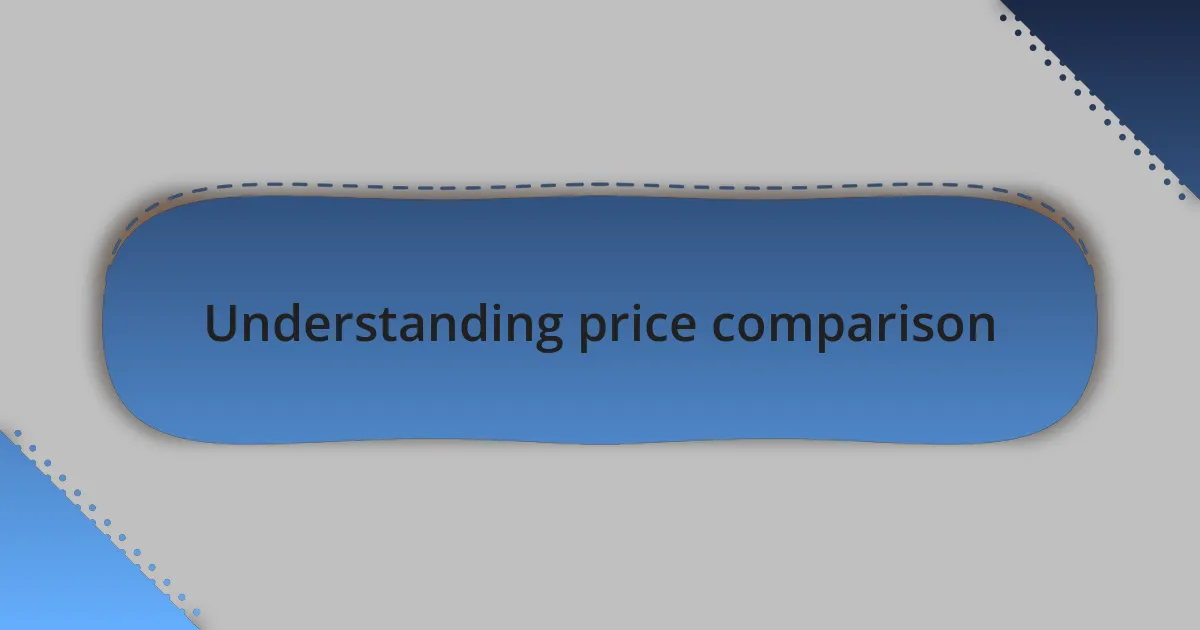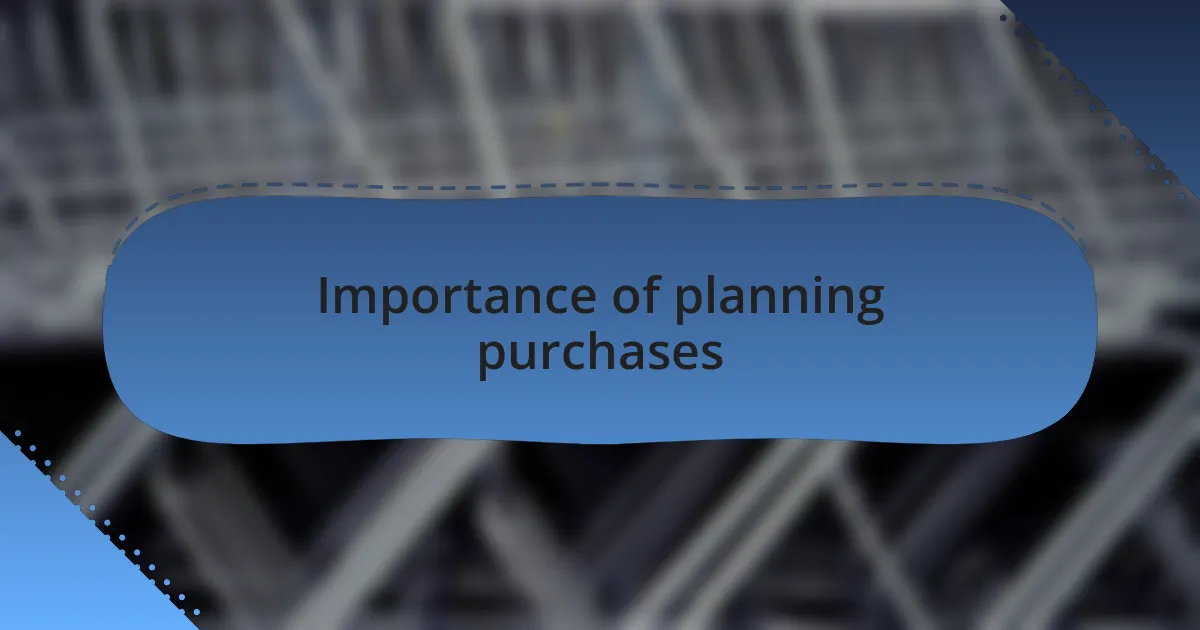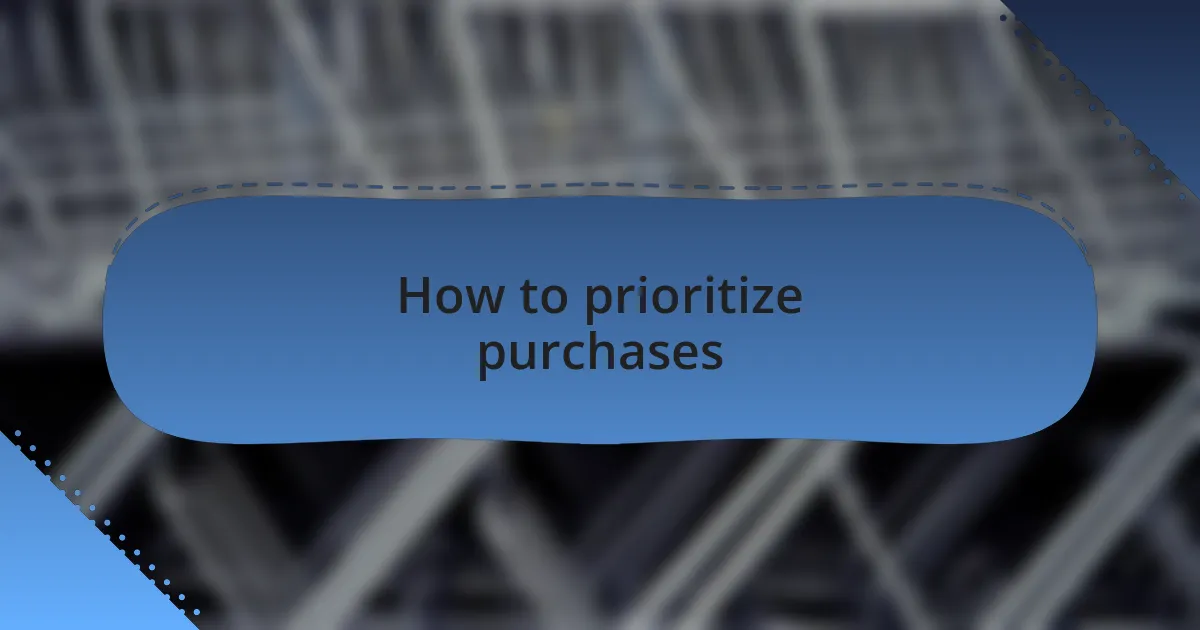Key takeaways:
- Price comparison empowers consumers to make informed purchasing decisions and can lead to significant savings.
- Planning purchases reduces anxiety and helps maximize budget and satisfaction by avoiding impulsive buying.
- Utilizing tools like price comparison websites, mobile apps, and personal sales calendars enhances the shopping experience and ensures better deals.
- Prioritizing purchases based on needs, sales cycles, and timing allows for more efficient budget allocation and increased savings.

Understanding price comparison
Price comparison is more than just a simple task; it’s an empowering strategy that allows consumers to make informed choices. I remember a time when I nearly bought a gadget at full price, only to check a price comparison tool and discover it was significantly cheaper at another retailer. That moment of realization taught me the value of being proactive in my purchasing decisions.
When we understand price comparison, we also grasp the concept of value—how much we truly get for what we spend. Have you ever found yourself wondering if that supposed deal was really a bargain? In my experience, the difference in price for the same item across various platforms can be staggering. A little effort in comparing prices can mean saving not just money but also time and frustration in the long run.
Additionally, price comparison fuels competition among retailers, ultimately benefiting consumers. I’ve often noticed that when I share my findings with friends, they too become more conscious of where they shop. It’s fascinating to think about how our collective awareness can shift pricing dynamics—not just for ourselves, but for everyone. Isn’t it empowering to know that we have a say in the prices we pay?

Importance of planning purchases
Planning purchases is vital because it transforms the buying experience into a more strategic endeavor. I recall a time when I mapped out my shopping list ahead of a holiday sale. Instead of impulse buying, I focused on my essential items, and as a result, I not only saved money but also avoided the chaos that often comes with last-minute shopping. How refreshing it was to feel in control rather than overwhelmed!
When I think about the importance of planning, I realize that it reduces anxiety. Picture this: you’re standing in a store, surrounded by countless options, feeling lost. That sense of panic can be quelled through a simple plan. Prioritizing what I need has always helped me navigate sales with clarity and purpose, making the experience far more enjoyable. Have you ever faced overwhelming choices only to walk away empty-handed?
Moreover, strategic planning allows me to take advantage of seasonal sales, leveraging discounts that retailers often offer. Last year, I waited patiently for a major electronics sale, and because I plotted my purchase in advance, I snagged a high-end gadget at a fraction of the cost. It’s incredible how much power we hold when we take the time to plan ahead, ensuring we maximize both our budget and satisfaction.
![]()
Strategies for tracking sales
One of the most effective strategies I’ve found for tracking sales is to use a combination of online tools and apps. For instance, I regularly check price comparison websites and subscribe to newsletters from my favorite retailers. These tools not only keep me informed about upcoming sales but also provide alerts for price drops on items I’ve been eyeing. It’s a simple yet powerful way to ensure I never miss a deal.
Another approach I appreciate is maintaining a wish list. I often compile a list of items I want to purchase, then monitor their prices over time. When I see a significant drop, I know it’s the right moment to buy. It adds a little thrill to my shopping experience, almost like a treasure hunt. Have you ever had the rush of finding a coveted item on sale right when you were ready to pull the trigger?
Additionally, following social media channels of brands can be quite insightful. I remember when a favorite clothing brand announced a flash sale on Instagram—only for their followers. Because I was already in the loop, I managed to grab a beautiful dress at half the price. Engaging with brands this way keeps me connected and often rewards me with exclusive discounts. It’s like being part of a club that offers perks for being in the know!

Tools for effective price comparison
When it comes to effective price comparison, utilizing browser extensions can be a game changer. I can’t tell you how many times I’ve found better deals while shopping online simply because a price comparison extension highlighted the savings as I browsed. It’s almost like having a little shopping assistant right in my browser, ensuring I get the best price without having to scour multiple websites.
Another handy tool I often rely on is mobile apps designed for price tracking. There’s one in particular that I’ve used to monitor the prices of electronics; every time there’s a dip, I receive a notification. It makes me feel like I have my finger on the pulse of the market. Have you ever had that moment of pure satisfaction when you realize you’ve snagged a fantastic deal? It’s that rush that fuels my shopping savvy.
For those who prefer a more traditional approach, keeping a detailed price book can be incredibly effective. I started documenting the prices of items I frequently purchase, which helped me identify trends over time. This practice not only sharpens my purchasing decision but also brings a sense of control and empowerment. Who doesn’t enjoy feeling like a smart shopper, right?

Creating a personal sales calendar
Creating a personal sales calendar has been one of the most beneficial strategies I’ve implemented in my shopping habits. By mapping out key sales events like Black Friday, Amazon Prime Day, and seasonal clearance events, I can effectively plan major purchases around these dates. It’s like setting appointment reminders for savings, and trust me, it feels rewarding when I score a deal I’ve been eyeing for months.
I also make a point to include local events and store-specific sales in my calendar. For instance, I remember an incredible experience when I realized my favorite home goods store had a surprise sale during a holiday weekend. I had marked it on my calendar and was ready to shop. It was thrilling to find items I had waited to buy, now marked down significantly. Are there certain stores you adore that often have unadvertised promotions? Adding these to your calendar can lead to unexpected savings.
Another aspect I love about my personal sales calendar is that it helps prevent impulse buying. By knowing when sales happen, I’ve learned to wait for the right moment to make a purchase instead of rushing out and spending on a whim. That moment of anticipation builds excitement, turning shopping into a strategic game, and who doesn’t enjoy winning?

How to prioritize purchases
When prioritizing purchases, I start by assessing my current needs versus wants. For example, last year I found myself needing a new winter coat. I weighed the urgency of this purchase against my desire for a new pair of shoes. It was clear: the coat took precedence. This approach not only saves money but also ensures that I invest in essentials first.
I’ve also found it helpful to create a list of potential purchases and assign them priorities based on my budget and the availability of sales. One time, I discovered a fantastic deal on cookware while browsing online. It was a great price, but I had also planned to buy a new laptop. By prioritizing my needs, I decided to hold off on the cookware and focus on getting the laptop, knowing the cookware would likely be on sale later. This strategy allows me to allocate my budget more efficiently.
Additionally, I’ve learned to be mindful of timing. Certain items have predictable life cycles regarding sales, and it’s beneficial to plan purchases based on these cycles. For instance, I always remind myself that gym equipment prices tend to drop at the beginning of summer when sales opportunities are plentiful. Recognizing these patterns empowers me to make informed decisions and maximize my savings. Have you ever noticed how waiting for a seasonal sale can transform your entire shopping experience? It’s a game-changer.